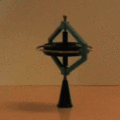Mechanics
Mechanics is a branch of Physics that deals with the behavior of physical bodies when subjected to forces or displacements, and the subsequent effects of these bodies on their environment. It is divided into two main branches: Classical Mechanics and Quantum Mechanics.
Classical Mechanics[edit]
Classical Mechanics is a branch of mechanics that deals with the motion of bodies under the influence of forces. It is primarily concerned with macroscopic systems and the laws governing their motion. The three fundamental laws of classical mechanics, known as Newton's Laws of Motion, form the basis for this branch of mechanics.
Newton's Laws of Motion[edit]
Newton's Laws of Motion are three physical laws that form the foundation for classical mechanics. They describe the relationship between a body and the forces acting upon it, and its motion in response to those forces.
Quantum Mechanics[edit]
Quantum Mechanics is a branch of mechanics that deals with phenomena on a very small scale, such as molecules, atoms, and subatomic particles like electrons and photons. It is a fundamental theory in physics that provides a description of the physical properties of nature at the scale of atoms and subatomic particles.
Wave-Particle Duality[edit]
One of the key principles of quantum mechanics is the Wave-Particle Duality. This principle states that every particle or quantum entity can be described as both a particle and a wave.
Applications of Mechanics[edit]
Mechanics has a wide range of applications in various fields such as Engineering, Astronomy, and Medicine. In engineering, mechanics is used to design and analyze the performance of structures and machines. In astronomy, it is used to understand the motion of celestial bodies. In medicine, it is used in biomechanics to understand the physical behavior of the human body.
-
Gyro
-
Arabic machine manuscript
-
Taccola first piston
-
Newton's law of gravity
Ad. Transform your life with W8MD's Budget GLP-1 injections from $49.99


W8MD offers a medical weight loss program to lose weight in Philadelphia. Our physician-supervised medical weight loss provides:
- Weight loss injections in NYC (generic and brand names):
- Zepbound / Mounjaro, Wegovy / Ozempic, Saxenda
- Most insurances accepted or discounted self-pay rates. We will obtain insurance prior authorizations if needed.
- Generic GLP1 weight loss injections from $49.99 for the starting dose of Semaglutide and $65.00 for Tirzepatide.
- Also offer prescription weight loss medications including Phentermine, Qsymia, Diethylpropion, Contrave etc.
NYC weight loss doctor appointmentsNYC weight loss doctor appointments
Start your NYC weight loss journey today at our NYC medical weight loss and Philadelphia medical weight loss clinics.
- Call 718-946-5500 to lose weight in NYC or for medical weight loss in Philadelphia 215-676-2334.
- Tags:NYC medical weight loss, Philadelphia lose weight Zepbound NYC, Budget GLP1 weight loss injections, Wegovy Philadelphia, Wegovy NYC, Philadelphia medical weight loss, Brookly weight loss and Wegovy NYC
|
WikiMD's Wellness Encyclopedia |
| Let Food Be Thy Medicine Medicine Thy Food - Hippocrates |
Medical Disclaimer: WikiMD is not a substitute for professional medical advice. The information on WikiMD is provided as an information resource only, may be incorrect, outdated or misleading, and is not to be used or relied on for any diagnostic or treatment purposes. Please consult your health care provider before making any healthcare decisions or for guidance about a specific medical condition. WikiMD expressly disclaims responsibility, and shall have no liability, for any damages, loss, injury, or liability whatsoever suffered as a result of your reliance on the information contained in this site. By visiting this site you agree to the foregoing terms and conditions, which may from time to time be changed or supplemented by WikiMD. If you do not agree to the foregoing terms and conditions, you should not enter or use this site. See full disclaimer.
Credits:Most images are courtesy of Wikimedia commons, and templates, categories Wikipedia, licensed under CC BY SA or similar.
Translate this page: - East Asian
中文,
日本,
한국어,
South Asian
हिन्दी,
தமிழ்,
తెలుగు,
Urdu,
ಕನ್ನಡ,
Southeast Asian
Indonesian,
Vietnamese,
Thai,
မြန်မာဘာသာ,
বাংলা
European
español,
Deutsch,
français,
Greek,
português do Brasil,
polski,
română,
русский,
Nederlands,
norsk,
svenska,
suomi,
Italian
Middle Eastern & African
عربى,
Turkish,
Persian,
Hebrew,
Afrikaans,
isiZulu,
Kiswahili,
Other
Bulgarian,
Hungarian,
Czech,
Swedish,
മലയാളം,
मराठी,
ਪੰਜਾਬੀ,
ગુજરાતી,
Portuguese,
Ukrainian



